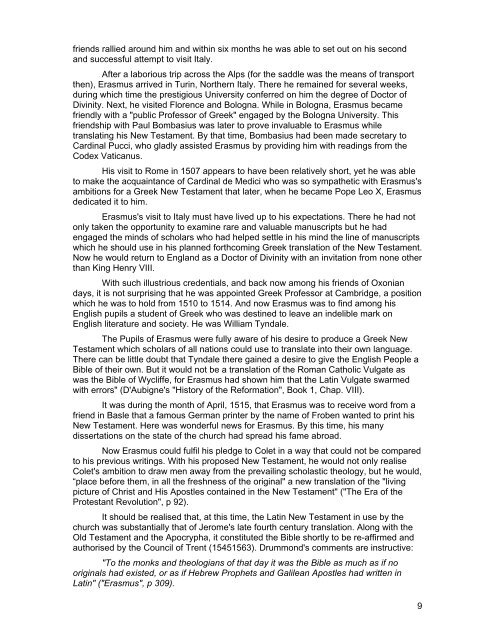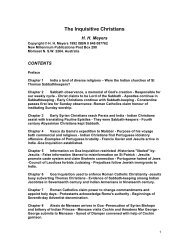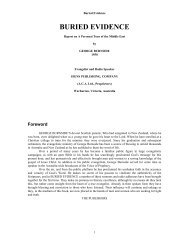Battle of the Bibles - Present Truth
Battle of the Bibles - Present Truth
Battle of the Bibles - Present Truth
Create successful ePaper yourself
Turn your PDF publications into a flip-book with our unique Google optimized e-Paper software.
friends rallied around him and within six months he was able to set out on his second<br />
and successful attempt to visit Italy.<br />
After a laborious trip across <strong>the</strong> Alps (for <strong>the</strong> saddle was <strong>the</strong> means <strong>of</strong> transport<br />
<strong>the</strong>n), Erasmus arrived in Turin, Nor<strong>the</strong>rn Italy. There he remained for several weeks,<br />
during which time <strong>the</strong> prestigious University conferred on him <strong>the</strong> degree <strong>of</strong> Doctor <strong>of</strong><br />
Divinity. Next, he visited Florence and Bologna. While in Bologna, Erasmus became<br />
friendly with a "public Pr<strong>of</strong>essor <strong>of</strong> Greek" engaged by <strong>the</strong> Bologna University. This<br />
friendship with Paul Bombasius was later to prove invaluable to Erasmus while<br />
translating his New Testament. By that time, Bombasius had been made secretary to<br />
Cardinal Pucci, who gladly assisted Erasmus by providing him with readings from <strong>the</strong><br />
Codex Vaticanus.<br />
His visit to Rome in 1507 appears to have been relatively short, yet he was able<br />
to make <strong>the</strong> acquaintance <strong>of</strong> Cardinal de Medici who was so sympa<strong>the</strong>tic with Erasmus's<br />
ambitions for a Greek New Testament that later, when he became Pope Leo X, Erasmus<br />
dedicated it to him.<br />
Erasmus's visit to Italy must have lived up to his expectations. There he had not<br />
only taken <strong>the</strong> opportunity to examine rare and valuable manuscripts but he had<br />
engaged <strong>the</strong> minds <strong>of</strong> scholars who had helped settle in his mind <strong>the</strong> line <strong>of</strong> manuscripts<br />
which he should use in his planned forthcoming Greek translation <strong>of</strong> <strong>the</strong> New Testament.<br />
Now he would return to England as a Doctor <strong>of</strong> Divinity with an invitation from none o<strong>the</strong>r<br />
than King Henry VIII.<br />
With such illustrious credentials, and back now among his friends <strong>of</strong> Oxonian<br />
days, it is not surprising that he was appointed Greek Pr<strong>of</strong>essor at Cambridge, a position<br />
which he was to hold from 1510 to 1514. And now Erasmus was to find among his<br />
English pupils a student <strong>of</strong> Greek who was destined to leave an indelible mark on<br />
English literature and society. He was William Tyndale.<br />
The Pupils <strong>of</strong> Erasmus were fully aware <strong>of</strong> his desire to produce a Greek New<br />
Testament which scholars <strong>of</strong> all nations could use to translate into <strong>the</strong>ir own language.<br />
There can be little doubt that Tyndale <strong>the</strong>re gained a desire to give <strong>the</strong> English People a<br />
Bible <strong>of</strong> <strong>the</strong>ir own. But it would not be a translation <strong>of</strong> <strong>the</strong> Roman Catholic Vulgate as<br />
was <strong>the</strong> Bible <strong>of</strong> Wycliffe, for Erasmus had shown him that <strong>the</strong> Latin Vulgate swarmed<br />
with errors" (D'Aubigne's "History <strong>of</strong> <strong>the</strong> Reformation", Book 1, Chap. VIII).<br />
It was during <strong>the</strong> month <strong>of</strong> April, 1515, that Erasmus was to receive word from a<br />
friend in Basle that a famous German printer by <strong>the</strong> name <strong>of</strong> Froben wanted to print his<br />
New Testament. Here was wonderful news for Erasmus. By this time, his many<br />
dissertations on <strong>the</strong> state <strong>of</strong> <strong>the</strong> church had spread his fame abroad.<br />
Now Erasmus could fulfil his pledge to Colet in a way that could not be compared<br />
to his previous writings. With his proposed New Testament, he would not only realise<br />
Colet's ambition to draw men away from <strong>the</strong> prevailing scholastic <strong>the</strong>ology, but he would,<br />
“place before <strong>the</strong>m, in all <strong>the</strong> freshness <strong>of</strong> <strong>the</strong> original" a new translation <strong>of</strong> <strong>the</strong> "living<br />
picture <strong>of</strong> Christ and His Apostles contained in <strong>the</strong> New Testament" ("The Era <strong>of</strong> <strong>the</strong><br />
Protestant Revolution", p 92).<br />
It should be realised that, at this time, <strong>the</strong> Latin New Testament in use by <strong>the</strong><br />
church was substantially that <strong>of</strong> Jerome's late fourth century translation. Along with <strong>the</strong><br />
Old Testament and <strong>the</strong> Apocrypha, it constituted <strong>the</strong> Bible shortly to be re-affirmed and<br />
authorised by <strong>the</strong> Council <strong>of</strong> Trent (15451563). Drummond's comments are instructive:<br />
"To <strong>the</strong> monks and <strong>the</strong>ologians <strong>of</strong> that day it was <strong>the</strong> Bible as much as if no<br />
originals had existed, or as if Hebrew Prophets and Galilean Apostles had written in<br />
Latin" ("Erasmus", p 309).<br />
9





